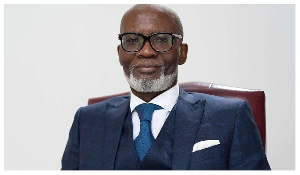Opinions of Thursday, 10 April 2014
Columnist: Okoampa-Ahoofe, Kwame
Decentralization Is About Hard Work, Doctors!
By Kwame Okoampa-Ahoofe, Jr., Ph.D.
The decision by the Ministry of Health (MOH) to have physicians, or medical doctors, paid their salaries by District Assemblies, or local governments, is a step in the right direction (See "Decision to Decentralize Doctors' Salary Laudable - Franklin Cudjoe" Citifmonline.com / Ghanaweb.com 4/6/14). But it is also a double-edged sword, in that it would ensure that doctors registered with the Ghana Medical Association (GMA) would be more closely monitored and supervised by the local representatives of the people that they serve, to ensure that these physicians actually work for the salaries paid them. This is what has been routinely characterized by some Ghanaian politicians as "value for money," a rather tired expression which has virtually become meaningless and decidedly cliched with morbid overusage.
With the current system, where salaries are paid by the central government in Accra, no such close supervision is guaranteed. Pay scales are automatic and not necessarily pegged to real work performed. Ofentimes, it is qualifications on paper, or sheepskin, that determine remuneration. The unsavory result is that, except for the most dedicated and conscientious professionals, many of these physicians, especially those posted to the boondocks, or rural communities, have become virtual fiefs or lords unto themselves. Little work is accomplished, and the resulting wastefulness is part of the problem being hotly debated over the so-called Single Spine Salary Structure (SSSS).
And this problem, it ought to emphasized, is not unique to doctors; all professionals and civil servants ought to be governed by this new decentralized salary regime. As of yet, no schedule, or timetable, has been provided by Health Minister Sherry Ayittey. My only suspicion here, however, is that the government may very well be using this newly proposed salary regime as a strategic method of breaking the back of the formidable Ghana Medical Association. It may be a tactical way of effectively undermining workers' unions; and this may, indeed, be the primary reason why the executive operatives of the GMA have expressed their vehement opposition to the proposal.
The most effective means of responding to the proposed new order is for the GMA to deftly coordinate the regional and district branches of the association, so as to ensure the continued coherence and cohesion of the entire organization, if its working principles and professional conduct are not to be compromised. And for the new salary regime to be effective, the government will need to streamline the management and administration of the National Health Insurance Scheme (NHIS) in order to make the latter far more efficient than it is presently.
Another negative backlash could be the massive exodus of many an experienced Ghanaian physician into the private sector; and if the unfortunate happens, healthcare expenditures are bound to exponentially rise. And so, really, to be effective, the Ministry of Health has to carefully study this new salary payment proposal and work out a delicate balance, or the unintended fallout could be devastating for both the quality of health services and expenditures.
Decentralizing the way that the health sector of the country's economy is managed, may also imply the rapid privatization of medical schools and other paramedical training institutions. Here, too, the government would need to conduct the requisite due diligence in order to ensure that only entrepreneurs with proven track-records in the training of health professionals are granted operational licenses. For the time being, and to guarantee the ready accessibility of qualitative medical services to every Ghanaian citizen and resident, the government would have to remain the dominant force/factor in this crucial sector of our national economy. At least until such a time that our economy becomes fairly viable and adequately advanced to sustain massive privatization.
____________________________________________________________
*Kwame Okoampa-Ahoofe, Jr., Ph.D.
Department of English
Nassau Community College of SUNY
Garden City, New York
April 6, 2014
E-mail: okoampaahoofe@optimum.net
###














